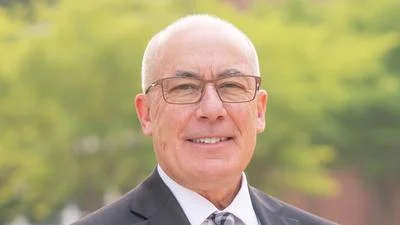October is Sudden Cardiac Arrest Awareness Month and the Dubuque Fire Department hopes the recent experience of a Dubuque firefighter will increase awareness of the importance of recognizing sudden cardiac arrest, calling 9-1-1, and knowing CPR.
According to the Mayo Clinic, sudden cardiac arrest is the abrupt loss of heart function, breathing, and consciousness. The condition can affect people of all ages who may seem to be healthy. It usually results from a problem with your heart’s electrical system, which disrupts your heart’s pumping action and stops blood flow to your body. Sudden cardiac arrest is not the same as a heart attack, when blood flow to a part of the heart is blocked. However, a heart attack can sometimes trigger an electrical disturbance that leads to sudden cardiac arrest.
Dubuque Fire Captain Tom Ludescher, 54, was enjoying a day off on Thursday, Sept. 15, 2022, doing outdoor property maintenance with his father. Brian Klinkner, a friend and recently retired firefighter, stopped by and joined them. After about 30 minutes, Klinkner noticed Ludescher looked hot and was in distress, so he placed Ludescher in his car to cool him. Klinkner, who witnessed his own father’s heart attack years before, knew his friend was having a heart attack and needed help -- and fast.
“I was totally fine and then something came over me and I needed to sit down,” said Ludescher, who does not have cardiac risk factors or a family history of heart issues. “Then I just kind of felt bad and was short of breath. I never had chest pains before, so I didn’t know what it was like.”
While driving to the hospital, Ludescher told Klinkner of his chest pain and shortness of breath. Klinkner knew Ludescher needed help faster than he could get him there, so he called 9-1-1 at 4:31 p.m. The 9-1-1 center staff was able to dispatch a Dubuque Fire Department response and redirected Klinkner to meet them in a bank parking lot.
“When I could hear the siren, that was a good feeling,” said Ludescher.
Upon arrival, Dubuque Fire staff found Ludescher pale and drenched in sweat. They quickly assessed and began treatment. After transferring him to the cot and into the ambulance, Ludescher became unresponsive. He had no pulse and staff began CPR and utilized an AED. Ludescher received two rounds of CPR and two defibrillations (shocks) using the “Wheel of Survival” and “Pit Crew CPR” system used by the Dubuque Fire Department.
“It was a weird feeling. I was aware most of the time and I thought, ‘Oh, they just shocked me. That didn’t hurt as much as I thought it would,’” he said. Able to laugh about it now, Ludescher said, “I also thought at the time, this must be stressful for these guys.”
After the second defibrillation, Ludescher’s vitals converted to an organized rhythm, and he regained consciousness. He said he was feeling better and his transport to MercyOne Dubuque Medical Center began.
Staff notified MercyOne’s heart catheterization lab with a STEMI alert so they could prepare for Ludescher’s arrival. (ST-Elevation Myocardial Infarction (STEMI) is a very serious type of heart attack during which one of the heart’s major arteries that supplies oxygen and nutrient-rich blood to the heart muscle is blocked.)
When the ambulance arrived at the hospital at 4:55 p.m., a cardiologist met them at the emergency department entrance and Ludescher was taken directly to the catheterization lab where a stent was placed in one artery and another artery was opened with balloon angioplasty. He was able to go home Saturday afternoon and is recovering.
Ludescher’s brother, Assistant Fire Chief Mark Ludescher, was among the staff dispatched on the call but did not know it was his younger brother he would be meeting until notified by dispatch. He witnessed the event and said the quality of the CPR administered on his brother was clear. “Tom stated afterwards that, during the arrest, he pretty much remembered everything -- including the second shock. That would be partially due to the high-quality CPR that he received during the event,” said Mark. “I remember during that time between shocks, during CPR, Tom was looking around and his eyes were focusing on the events happening inside the ambulance.”
Dubuque Fire EMS Supervisor Samuel Janecke said this call, although the patient was “one of their own,” was handled like any other cardiac arrest call and was a success for several reasons. “The fact that there was early recognition of the patient being in cardiac arrest, the organization of our response process, and the early activation of the catheterization lab all made the difference,” said Janecke. “Seconds count in a STEMI response and everything came together as it should.”
“The days of the fire department being viewed as separate from emergency medical services have come to an end. Every Dubuque Fire Department responder is trained to provide advanced medical care and every response vehicle, including the fire engines and ladder trucks, is equipped with advanced medical equipment to assist them in providing advanced level care,” said Dubuque Fire Chief Amy Scheller. “This was a day when the early recognition, quick response, advanced cardiac protocols, equipment, and highly skilled emergency responders came together to save one of our own. I am truly proud of every member of this organization who continually seeks out advanced training opportunities and pushed the organization forward.”
Original source can be found here.



 Alerts Sign-up
Alerts Sign-up